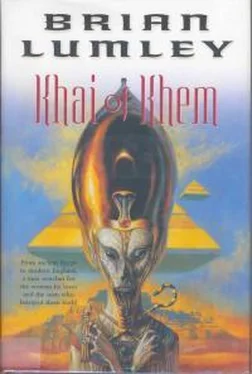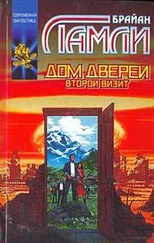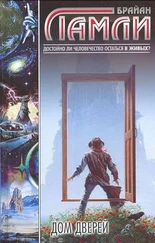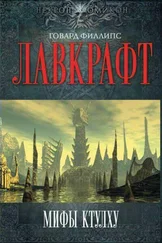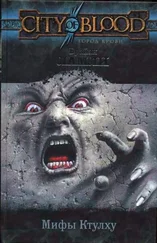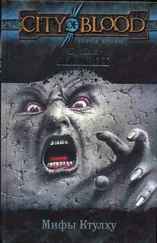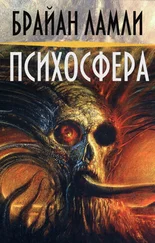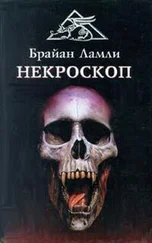Khai beckoned Kindu and Nundi forward and ran along the smoke-filled corridor toward the spot where the Vizier had lurked in the shadows, but scarce had he taken ten paces before he heard a sound which caused his flesh to creep and the short hairs at the back of his neck to stand up straight. It was a single, eerie, undulating note—and Khai knew that it had been blown on a tiny golden whistle….
That single blast of Anulep’s golden whistle almost brought Khai to a halt, for in his mind’s eye, he now saw the sight which must surely meet him around the next bend in the corridor. He remembered the heavy metal gate in the wall, whose bars were thick and strong, and he remembered the inhabitants of that vault, how they had been brought to a moldering and murderous life by the Vizier’s fiendish piping—that same warbling note whose echoes even now rang in his ears.
Khai’s torch was gone, lost in the inferno he had wrought, and now the only light was that which glimmered from tiny lamps placed in wide-spaced niches along the walls. He slowed his run to a careful, crouching walk and spoke to his lieutenants in a voice which barely concealed his trepidation.
“Boys, around this bend will be something to freeze the blood in your veins—a sight you’ll never forget, as I have never forgotten it—but we must not turn and flee. Anulep went this way, and we have to follow him.”
Now Kindu best remembered Khai as the boy who saved his life those long years ago in the forest east of the river, and he was Khai’s senior by almost twenty years, but still he did not mind Khai calling him “boy.” He did object, however, to what he considered a slight on his own and his fellow Nubian’s manliness.
“Flee, Khai?” he protested. “We would not think of—”
“No one doubts your bravery, man,” Khai quickly cut him off. “I’m only trying to tell you that we—” but there he broke off as the horror abruptly lurched into view, coming around the bend toward them where they half-crouched in oppressive gloom.
“Zombies!” Nundi gasped.
“Dead men!” Kindu choked out the words. “But they walk!”
The corridor was full now of stumbling, shuffling corpses whose outlines were aglow with rotten luminescence. Their eyes were pits of balefire and fat, wriggling worms dropped from their crumbling flesh even as they moved silently on the trio of frozen intruders. There were perhaps two, three dozen of these terrible once-men, and the smell of their corruption beggared description.
For all that many of them were in the last stages of putrefaction, disintegrating even as they came, still the speed of their approach was terrifying. Before Khai and his Nubians could force their paralyzed limbs to mobility, the clawing, silently mouthing, greenly glowing horde of cadavers was on them. On the floor of the corridor legless trunks wriggled to trip them, and torsos without arms thrust forward mummied faces with open jaws and chomping teeth.
Khai was the first to pull himself together, and as he began to shout his instructions so his lieutenants started at the shock of his voice in the terror-laden silence. “They’re only dead men,” Khai cried. “Dead and rotting men whose souls scream in hell. They can’t stand against us, so cut them down!”
Still Kindu and Nundi shrank back.
“Leather and bone and worms,” Khai yelled. “Look—” and he swept his sword through two of the advancing creatures with one clean stroke. Down went the zombies, crumbling into dust and rot.
Now the Nubian warriors took heart, and Khai wondered if he himself would have recovered so swiftly had the roles been reversed. For he had prior knowledge of this blasphemy and should therefore be, in a measure, prepared for it. However that might be, now the trio stood shoulder to shoulder with their backs to the wall of rock, and as the undead horde pressed close so they hacked and hewed until at last they stood in a semicircle of heaped enemies.
Then, stomachs heaving as they gagged on poisonous air, they stepped gingerly through half-liquescent, half-powdery loathsomeness and went on shakily down the rock-cut tunnel. Khai paused at the first small lamp to lift it from its niche, turn and toss it back onto the pile of human debris that littered the floor. His action was one of instinct and not logic, for corpses are not so easy to burn. But these corpses had been treated with rare oils and chemicals, and sure enough they flared up in an instant with a bright and cleansing light. And it was by that purifying light that the three men made their way along the tunnel to the next flight of stone stairs, which they gladly climbed to the saner levels above. There, where dimly cavernous temples and halls loomed beyond every stone arch, many of Rush’s warriors impatiently prowled in the gloom and called Khai’s name. Relieved to see him emerge from below, they now set about to burn every flammable thing in sight; and while some put torches to tapestries and curtains, others poured perfumed oil onto toppled statues of hybrid Khemish gods, or smashed rich chairs and tables into shattered fragments of kindling.
And so, retreating in the face of self-set fires, Khai’s warriors moved out from the pyramid’s center toward the clean air and the light of the outside world. It was then, as they hastened to join the battle which still raged in the streets of the city, that they heard high overhead a rumbling like that of long drawn out thunder. Khai paused in a corridor rapidly filling with fire to turn his eyes to the ceiling. He felt his flesh creep in sudden apprehension. Somewhere up above a great weight had shifted, a massive block of stone had pivoted. But for what purpose?
Khai believed he knew the answer to that question. He saw again his father’s plans of the pyramid, remembering them from so long ago. Those sketches he had so admired as a boy, of gigantic mechanisms designed to operate at the touch of a lever—to spill thousands of tons of sand down into these lower levels. And worse: to seal the base of the pyramid off forever from the outside world!
“Move!” he shouted at once. “Out, quickly—or stay here forever!”
Even as he yelled his warning a stream of fine sand gushed down from an opening in the ceiling, quickly forming a mounting pile as it spilled upon the floor. And now there arose all around the whisper and rush and slither of sand; and yet again, from somewhere high overhead, there came a rumble of great weights in motion. Along all of the many corridors, jets of sand were now erupting from overhead apertures, similarly in the temples and halls, and already the floor was inches deep with fine grains which sifted deeper by the second as the flow of sand increased.
It was not the sand which bothered Khai as he ran, however, but the thought of something else. Even now, at this very moment, great slabs of stone were tilting in the mighty walls of the pyramid, pivoting beneath the weight of sand from above. Before the sand could begin to spill out through the many huge doorways which lined the four sides of the pyramid’s base, these great stone “doors” would tilt into vertical positions and slam down, closing the lower regions off from the outside world for all time.
It was every man for himself now, for quite obviously to linger here would mean a monstrous, choking death. Khai raced with Kindu, Nundi and some fifteen others of his men along one of the square corridors leading to safety. Daylight showed ahead through a haze of yellow dust and flying sand, and Khai urged his warriors on as he listened for a sound other than their cursing and the rushing hiss of sand.
And finally that sound came: of a massive weight slamming down like a hammer of the gods. The ground trembled briefly to the thump of that mighty blow, and Khai began to count as he ran. At a count of ten there came a second thump and shuddering of the earth, and now he knew the worst— that indeed the titan doors were closing, falling into their predetermined places.
Читать дальше
